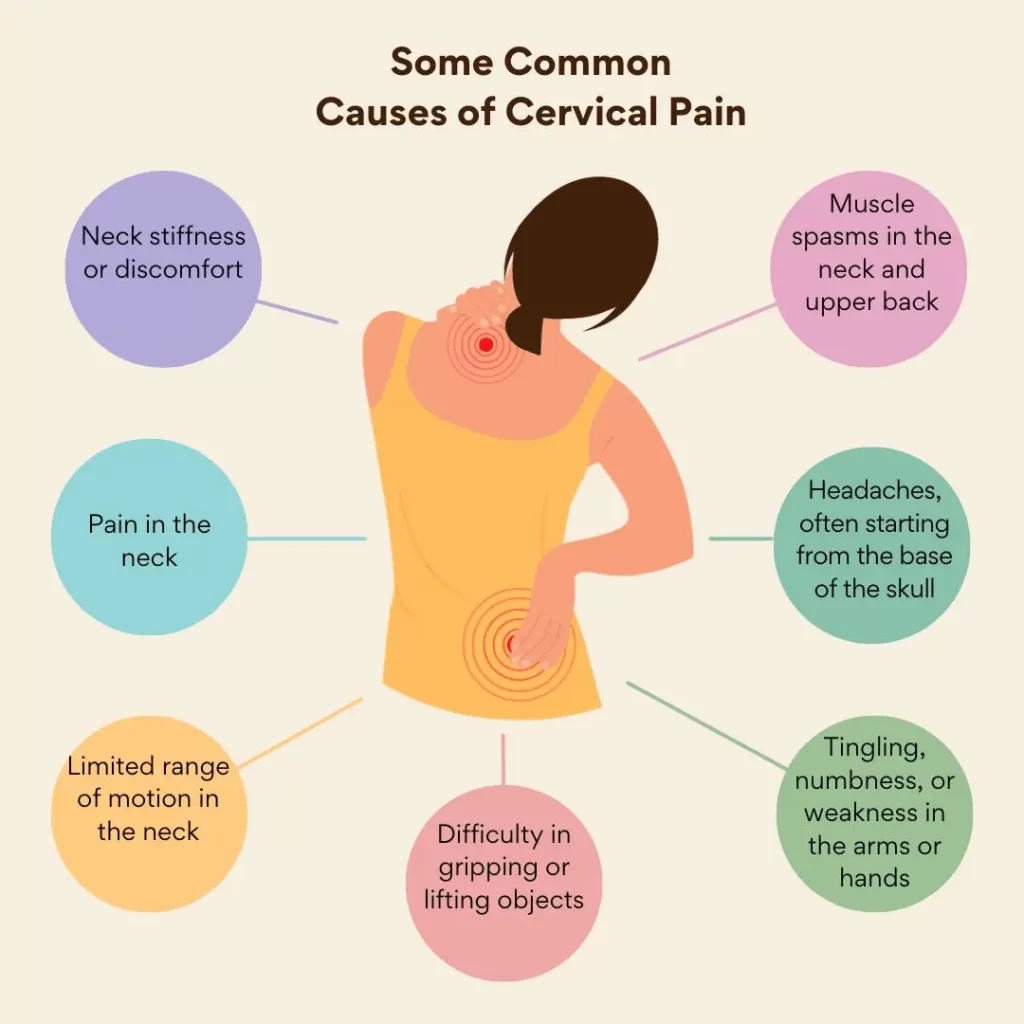Neck PainTreatment
in Mumbai
Sometimes, regardless of your concentration level, you can’t concentrate on anything or sleep properly. Do you know the reason? It is due to neck pain. All of us have experienced neck pain at some point. Usually, it is not severe and gets better on its own; however, you sometimes need to go the extra mile and get treated for neck pain.

So, if you are looking for neck pain treatment in Mumbai, read further to learn all the details before you approach a neck pain treatment doctor. This will clarify whether you need to go to a doctor.
Symptoms of Neck Pain
Neck pain significantly impacts your daily life. But how do you know if your neck pain is something serious? Here’s a breakdown of the common symptoms to watch out for:
Pain
- This is the most apparent symptom. It is experienced as a dull ache, sharp pain, or a burning sensation in neck muscles.
- The location of the neck pain can vary depending on the cause. For example, pain concentrated at the base of your skull might indicate a pinched nerve, while pain throughout your neck could be due to muscle strain.
Stiffness and Reduced Mobility
- Neck pain often restricts one's ability to move one's head freely. One might experience difficulty turning one's head from side to side, tilting it forward or backward, or looking up.
Headaches
- Neck pain frequently triggers headaches, especially tension headaches that cause a dull, pressing sensation around the head or forehead.

Other Symptoms
Other symptoms which you might are
Numbness or tingling
This can occur in your neck, shoulders, arms, or hands and indicates nerve irritation.
Muscle weakness
You might feel weakness in your neck muscles, making it difficult to hold your head up.
Dizziness
Sometimes, neck pain can be accompanied by dizziness or lightheadedness.
Pain radiating down the arm
This could be a sign of nerve compression. It affects the nerves that travel from your neck to your arm.
When Should You Approach a Doctor for Neck Pain?
While most neck pain resolves with self-care or conservative treatment, some symptoms warrant immediate medical attention:
- Sudden and severe neck pain, particularly after an injury
- Pain accompanied by fever, chills, or unexplained weight loss
- Numbness, weakness, or tingling that worsens or persists
- Difficulty swallowing or breathing
- Loss of bladder or bowel control
Causes of Neck Pain
Neck pain is a widespread issue, plaguing millions of people worldwide. It can be mild or severe but it significantly impacts your daily activities. But what exactly triggers this discomfort? Here’s a breakdown of the most common causes of neck pain:
Poor Posture
- This is a primary culprit, particularly in our tech-driven world. Slouching over laptops, hunching over smartphones (text neck!), and maintaining poor posture for extended periods strains the neck muscles and ligaments. Prolonged strain can contribute to the development of pain and stiffness
Muscle Strain
- Sudden movements, lifting heavy objects with improper technique, or even repetitive motions like typing can lead to muscle strain in the neck. This strain causes pain, tenderness, and reduced mobility in the affected area.
Injuries
- Whiplash, a common injury from car accidents, abruptly jolts the head and neck backward and forward. Damage to these structures can disrupt neck function, causing pain, limited movement, and headaches. Other injuries like falls or sports accidents can also cause neck pain.
Degenerative Disc Disease
- As we age, the discs between our vertebrae (spinal bones) can wear down and lose their cushioning ability. Nerve irritation and inflammation within the cervical spine can manifest as pain, a loss of sensation, and decreased strength.
Arthritis
- The degenerative joint disease, osteoarthritis, can impact the neck's joints, leading to pain, limitations in movement, and a decline in flexibility.
Stress
- Stress doesn't just affect your mind; it can manifest in your body too. One common physical symptom is neck pain. When stressed, your muscles become tense, which leads to pain and discomfort in the neck.
Sleeping on an Uncomfortable Mattress
- An old, sagging mattress or one that doesn't provide proper support for your spine can strain your neck muscles throughout the night, leading to pain and stiffness when you wake up.
Other Less Common Causes
Certain medical conditions like nerve compression, infections, and tumors can also cause neck pain. However, these are less frequent causes. In addition to muscle strain and poor posture, neck pain can serve as a symptom of various medical conditions. These include:
- Osteoarthritis
- Fibromyalgia
- A compressed or pinched nerve
- A spinal cord injury
How is Neck Pain Diagnosed?
You might wonder why a neck pain doctor in Mumbai should diagnose neck pain when the patient complains about it. You are right. But the question here is whether we should analyze what is causing the neck pain.
To diagnose neck pain, we generally perform physical examinations and imaging tests (if required); in rare cases, we perform neurological tests.
Medical History and Physical Examination
- We start by discussing your medical history, including any recent injuries, occupation, and activities that might contribute to neck pain.
- During the physical exam, we assess your neck's range of motion, tenderness, and muscle strength. We also check for nerve problems by testing your reflexes and sensation in your arms and hands.
Text Neck
- The repetitive strain on the neck muscles from this posture can lead to:
- Pain in the neck and upper back
- Tightness and stiffness
- Headaches
- Repetitive use of mobile devices with a forward-bent head posture can trigger a particular type of neck pain.
Imaging Tests (if needed)
Depending on the severity and nature of your pain, we recommend further tests to get a clearer picture.
X-rays
can reveal bone fractures, arthritis, or abnormal bone alignment in the neck.
MRI
It leverages powerful magnets and radio waves to generate intricate pictures of soft tissues like muscles, ligaments, discs, and even the spinal cord. This non-invasive technique aids in diagnosing conditions such as herniated discs and nerve compression.
CT scan
This creates detailed cross-sectional images of your neck, providing a better view of bones, muscles, nerves, and blood vessels.
Neurological Tests (in rare cases)
Sometimes, we might order specialized tests to evaluate nerve function, especially if they suspect nerve damage is causing pain.
Electromyography (EMG)
It is a diagnostic procedure that evaluates the electrical activity of muscles. This test can reveal signs of muscle damage or nerve issues.
Nerve conduction studies
These measure how well electrical signals travel through your nerves, aiding in identifying nerve compression or damage.
Putting the Pieces Together
Based on the information gathered from your history, physical exam, and any imaging tests, we arrive at a diagnosis for your neck pain. This diagnosis will determine the most appropriate treatment course.
How is neck pain treated?
Neck pain can be a real drag, especially in a bustling city like Mumbai. But fear not; various treatment options are available to help you regain your pain-free movement. Here’s a breakdown of both non-surgical and surgical approaches commonly used by neck pain specialists in Mumbai:
Non-Surgical Treatments For Neck Pain
Rest
Give your neck a break! Avoid strenuous activities that could further irritate the inflamed tissues.
Heat/Ice Therapy
To manage pain, alternate applying heat (heating pad) or cold therapy (ice pack wrapped in a napkin) to the affected area for 15-20 minute intervals, following professional recommendations. Heat promotes relaxation, while ice reduces inflammation.
Over-the-counter Pain Medication
Certain medications available without a prescription, like ibuprofen and acetaminophen, may provide relief from neck pain and discomfort.
Ergonomic Adjustments
Optimize your workstation in Mumbai! Invest in a supportive chair with good neck and back support. Position your monitor at eye level and use a comfortable keyboard height.
- Gentle stretching and strengthening exercises designed for the neck muscles can improve flexibility and range of motion, reducing pain. A physiotherapist in Mumbai can create a personalized exercise program for you.
- Yoga postures focusing on neck stretches and strengthening can improve flexibility and posture. Meditation can help manage stress, which can sometimes worsen neck pain.
- Skilled massage therapists in Mumbai can use various techniques to relieve muscle tension, improve blood flow, and promote healing in the neck area.
Surgical Treatments (Only in Severe Cases)
While non-surgical options are usually the first line of defense, a neck pain specialist in Mumbai might recommend surgery in rare cases, this is generally considered if conservative treatments fail to provide relief or if nerve compression is causing significant pain, weakness, or numbness.
Types of neck surgery in Mumbai might include
Microdiscectomy
Removal of a herniated disc fragment pressing on a nerve.
Cervical fusion
Stabilization of vertebrae in the neck using bone grafts or implants.
Foraminotomy
Removing a small portion of bone creates more space for a pinched nerve.
What happens if neck pain is not treated?
Neck pain distracts you and disturbs your state of mind. You cannot concentrate on work, sleep, or enjoy life fully.
Leaving neck pain untreated can lead to a cascade of problems. Here’s a breakdown of some potential consequences:
Worsening Pain and Stiffness
Ignoring neck pain often leads to a vicious cycle. The discomfort discourages movement, further stiffening the muscles and worsening the pain. This can make even simple tasks like turning your head or looking up difficult and painful.
Chronic Pain
If left untreated, acute neck pain can become chronic, a persistent issue that interferes with daily activities and sleep quality.
Muscle Weakness and Imbalance
Untreated neck pain can lead to weakness in the neck muscles, affecting your posture and stability. This weakness can also strain other muscle groups, potentially causing shoulder and upper back pain.
Headaches
Neck pain frequently triggers headaches, especially tension headaches that cause a dull, pressing sensation around the head or forehead. Chronic neck pain can lead to more frequent and severe headaches.
Nerve Damage (In Severe Cases)
In rare instances, neglecting severe neck pain caused by conditions like herniated discs can lead to nerve damage. This can manifest as numbness, tingling, or weakness radiating down your arm or hand.
Reduced Mobility and Quality of Life
Untreated neck pain can significantly restrict your range of motion, hindering your ability to participate in activities you enjoy. This can negatively impact your overall quality of life and well-being.
Mental Health Impact
Chronic pain can take a toll on your mental health, leading to anxiety, depression, and difficulty sleeping.
Can other medical conditions lead to neck pain?
Neck pain can be a symptom of various medical conditions beyond muscle strain or poor posture. Here are some potential underlying conditions that can cause neck pain:
Degenerative Disc Disease
The discs between our vertebrae (spinal bones) naturally wear down as we age and lose their cushioning ability. This can lead to irritation and inflammation of the nerves in the neck, causing pain, numbness, and weakness.
Arthritis
Osteoarthritis, the "wear-and-tear" type of arthritis, can affect the joints in the neck, causing pain, stiffness, and reduced flexibility. Rheumatoid arthritis, an autoimmune disease, can also affect the neck joints.
Nerve Compression
Conditions like spinal stenosis, where the spinal canal narrows, or a herniated disc can compress nerves in the neck, leading to pain, numbness, tingling, and weakness that may radiate down your arm.
Fibromyalgia
This chronic condition causes widespread pain and tenderness, including in the neck and shoulders.
Meningitis
This is an inflammation of the meninges, the membranes surrounding the brain and spinal cord. It's a severe medical condition that can cause a stiff neck, fever, headache, nausea, and confusion.
Whiplash
This common injury from car accidents jolts the head and neck backward and forward abruptly. This can damage muscles, ligaments, and discs in the neck, leading to pain, stiffness, and headaches.
Infections
Although less common, infections of the bones, joints, or soft tissues in the neck can cause pain and stiffness.
Tumors (Rare Cases)
In rare instances, tumors in the bones, muscles, or nerves of the neck can cause pain and other neurological symptoms.
It’s important to note: This list is not exhaustive, and a doctor can diagnose the underlying cause of your neck pain through a proper medical evaluation.
How to prevent neck pain?
Neck pain is a prevalent issue, but the good news is you can take steps to prevent it from taking hold. Here are some key strategies to incorporate into your daily routine:
- This is the golden rule! Be mindful of your posture throughout the day, whether sitting, standing, or walking.
- Keep your shoulders relaxed, with your ears directly above your shoulders.
- Avoid slouching or hunching over your phone or computer.
- If you work at a desk, ensure your workstation is ergonomically designed to support your neck and back.
- Invest in a chair with good lumbar support and adjust the height so your feet rest flat on the floor.
- Position your monitor at eye level to avoid straining your neck to look up or down.
- Avoid sitting for extended periods. Get up and move around every 30-60 minutes to improve blood flow and prevent muscle stiffness.
- Perform simple neck stretches or light walking to keep your neck muscles loose.
- Regularly performing neck strengthening exercises can improve stability and flexibility, making your neck less susceptible to injury.
- Consult a physical therapist for a personalized exercise program tailored to your needs.
- Ensure you get enough quality sleep (7-8 hours for adults).
- Use a supportive pillow that aligns your head and neck properly.
- Chronic stress can lead to neck pain. Deep relaxation techniques like deep breathing, meditation, or yoga can be helpful to manage stress.
- Be mindful of your phone usage habits. Avoid holding your phone in front of your face for extended periods, as this can strain your neck muscles.
- Take breaks and use speakerphone or headphones for calls whenever possible.
- Carrying excess weight strains your entire musculoskeletal system, including your neck. Maintaining a healthy weight can help alleviate neck pain.
- When lifting objects, use proper form to avoid straining your neck. Bend at your knees and keep your back straight, using your leg muscles to do the lifting.
- Dehydration can contribute to muscle stiffness, including in the neck. Drink plenty of water throughout the day to stay hydrated.
- Pay attention to your body's signals. If you start to experience neck pain, take a break from activities that might aggravate it.
If you have neck pain and are staying in Mumbai, you can contact Dr. Uday Pawar, a neck pain specialist in Mumbai, to get relief.
Frequently Asked Questions
Yes, walking is generally good for neck pain. Low-impact exercise like walking improves blood flow, reduces stiffness, and promotes healing. However, if walking worsens your pain, consult your doctor.
Here are some tips for sleeping to avoid neck pain:
- Use a supportive pillow that keeps your neck aligned with your spine.
- Sleep on your back or side instead of your stomach.
- Avoid using multiple pillows.
It's generally safe to massage the muscles around your neck and shoulders, avoiding areas with bony prominences or directly on the spine. If you have any concerns, consult a massage therapist experienced in neck pain.
Vitamin D deficiency can sometimes contribute to neck pain, especially if associated with muscle weakness. However, neck pain alone isn't a specific symptom of any vitamin deficiency. A doctor can assess your needs through blood tests.
Yes, applying heat, like a warm compress or a hot shower, can help relax muscles and reduce neck pain. However, prolonged heat can irritate the skin. Alternate heat with ice packs for short durations (20 minutes) for optimal pain relief.

